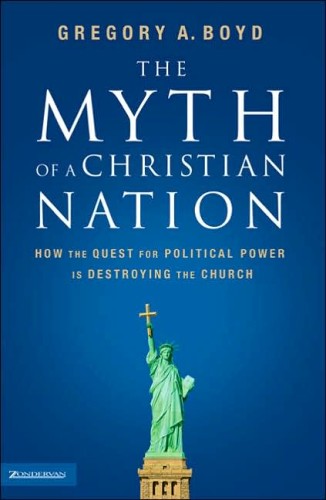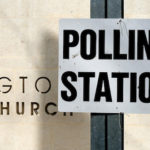We run our website the way we wished the whole internet worked: we provide high quality original content with no ads. We are funded solely by your direct support. Please consider supporting this project.

Remembering the Myth During Election Season
Given the current political furor in America right now, we thought we would post an extended quote from Greg’s book The Myth of a Christian Nation. This book was originally a reflection on Christian political engagement during the 2004 election, and how conflating “America” with Christianity is devastating to the mission we’ve been given in the world. We seem not to have learned much since then.
The myth of America as a Christian nation, with the church as its guardian, has been, and continues to be, damaging both to the church and to the advancement of God’s kingdom. Among other things, this nationalistic myth blinds us to the way in which our most basic and most cherished cultural assumptions are diametrically opposed to the kingdom way of life taught by Jesus and his disciples. Instead of living out the radically countercultural mandate of the kingdom of God, this myth has inclined us to Christianize many pagan aspects of our culture. Instead of providing the culture with a radically alternative way of life, we largely present it with a religious version of what it already is. The myth clouds our vision of God’s distinctly beautiful kingdom and thereby undermines our motivation to life as set-apart (holy) disciples of this kingdom.
Even more fundamentally, because this myth links the kingdom of God with certain political stances within American politics, it has greatly compromised the holy beauty of the kingdom of God to non-Christians. This myth harms the church’s primary mission. For many in America and around the world, the American flag has smothered the glory of the cross, and the ugliness of our American version of Caesar has squelched the radiant love of Christ. Because the myth that America is a Christian nation has led many to associate America with Christ, many now hear the good news of Jesus only as American news, capitalistic news, imperialistic news, exploitive news, antigay news, or Republican news. And whether justified or not, many people want nothing to do with any of it. (pp. 13-14)
Category: General
Tags: America, Myth of a Christian Nation, Nationalism, Politics, Religious Idolatry
Related Reading

Lighten Up: Election Season Blues
It’s a little sad (but still pretty funny) that there are actual campaign posters similar to this one. The next time you get fed up or discouraged with all the over-the-top election ads, you might want to browse through these for a chuckle. And remember that our hope is not located in any election. Thank…

Jesus and Democracy
Question: I’ve heard that the reason Jesus didn’t speak up on political issues was because he didn’t have the benefit of living in a democracy. Since we do, don’t we have a duty both to God and our country to be involved in politics? Answer: If the reason Jesus didn’t speak up on political issues…

Watch Greg on CNN’s “God’s Warriors”
This video is a CNN.com video of Greg’s segment on God’s Warriors. Greg’s interview starts at 2:07. The following was taken from a post on Greg’s blog (August 24, 2007): Thoughts on “God’s Warriors” from “The Heretic” Hi folks, I and a bunch of friends just finished watching Christiane Amanpour’s CNN documentary entitled “God’s Christian…

The Image of God
Distorted from digma.com Is the image of God you hold in your heart one that attracts or repels you?

The Politics of Demonization
Jonathan Martin posted a blog this week that we wanted to share called the politics of demonization (demonic talk on immigration, & other things). Have you noticed the hateful ways that we characterize the “other” in public discourse? Jonathan suspects (and we agree) that there’s a powerful force driving this tendency in all of us. As he puts it…

As We Approach the 4th
zen Sutherland via Compfight This is the time of year when we start hearing loud bangs at night and you have to ask yourself the following multiple choice question: Was that bang: a car backfiring? firecrackers? a gunshot? (OK, maybe most of you never think of that, but some of us do.) It’s also…
